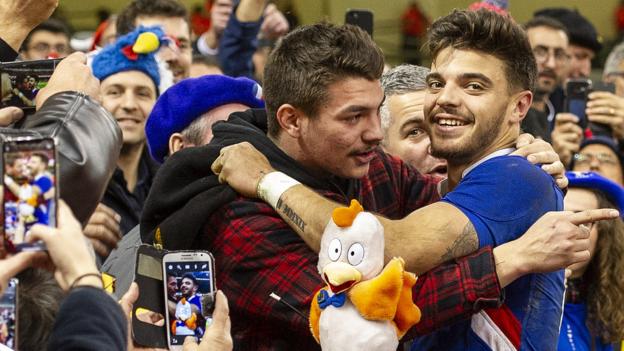
There's an understandable love-in going on around the France team right now, a celebration of their revival, a glorying in their return as Grand Slam contenders after a decade of failure. They're back. Maybe.
In a championship that has been decidedly underwhelming in terms of quality and has now become fractured by coronavirus, the Six Nations has needed this storyline from Paris. But are we totally sold on France's invincibility? Are they actually the real deal or are we so desperate for them to be the real deal that we're ignoring some vulnerabilities that might yet find them out?
Fabien Galthie's team answered some questions in Cardiff a fortnight ago but they have a few more to answer at Murrayfield on Sunday. They have lost three in a row in Edinburgh. The local diehards - and serial optimists - could construct a case around Scotland winning this one.
Home advantage for a start. France's scrum has been giving up penalties, France's defence, though improved, has given up seven tries in three games. They won at the Principality but they probably should have lost. Depending on what colour eyes you have, that's either a positive or a negative.
France have only been behind for a sum total of three minutes in this championship. They haven't been asked to play catch-up. Scotland have to put them in that dark place if they are to stand a chance.
The Scots have had an odd championship, narrow losses to Ireland and England and a flawed victory over Italy in Rome. Their own defence has been excellent, their attack wasteful. Where before they blew themselves out of games through comedy errors and minimal resistance when the pressure came on them, they now seem to have a significant resilience, an ability to scrap and fight and stay in the hunt.
As one player said last week: "When we put it all together, somebody's getting turned over." Can they, though? Without Finn Russell, do they have the unpredictability required?
Gregor Townsend has brought back Fraser Brown at hooker and Nick Haining at No 8, the two most physical players he could have selected in those positions. France have many things going for them and power is just one. In this fixture in Paris last year, they did such a huge number on Scotland in the aggression stakes that you almost wanted to look away at times. Scotland fancy themselves in that department nowadays.
There's a rapprochement, but no return of Russell, so they'll have to unlock this France defence with pretty much the same crew that have produced just three tries in three games, all against Italy. Townsend might draw comfort from the fact that multiple opportunities were created outside of the three chances they actually took. But they need to start taking them now.
Can Scotland beat kings of fast start?
There is a recurring theme around Galthie's team as they bear down on Scotland and their pursuit of a Grand Slam. It's not just the consistency of their results that stands out - three wins in a row in the championship for the first time in a decade - it's the way they've established a platform for those results.
France have become kings of the fast start. In all three of their games so far they've scored a try inside the opening seven minutes, which is a bit of a continuation of a theme from the World Cup in Japan, where they scored against Tonga and United States inside six minutes before scoring twice inside eight against Wales.
That quarter-final in Oita in October ended up in defeat thanks to the steepling stupidity of Sebastien Vahaamahina, who has now retired from international rugby - one of 21 French players who played in last season's Six Nations but who have not and - almost certainly - will not play in this one. Some turnover, some turnaround.
On their road to Murrayfield on Sunday, the French have led pretty much all the way. When they get ahead, they stay ahead. That stability is also new. The Shaun Edwards Factor, if you like. France have had consistency of selection compared to the musical chairs policy. They have a young team that have been allowed to bond.
In four games, including Sunday, France have made just one change to the starting pack. One. And it was an injury that caused it. For Murrayfield, Jefferson Poirot comes in for Cyril Baille at loosehead - and that's it. The same hooker and tighthead four games running, the same second-row and back-row, too. The selectorial axe has been replaced by a tickle stick.
There is so much to admire in this team, from the lethal intelligence of Anton Dupont at nine and the brilliance of Romain Ntamack at 10 to the resilience of the heavy mob up front, particularly in the back row, a wonderful amalgam of brutality and dexterity, carriers and leaders.
France have flair but they also have a new pragmatism and a streetwise dimension. They're kicking for territory now more than before - and more than anybody else in the championship. Way more. Once they gain territory they've been pretty clinical in their execution.
In their victory against England, they spent less than two minutes attacking in England's 22, whereas England had more than 10 minutes attacking in France's 22. French efficiency won the day.
The same in Wales. Wayne Pivac's team had more than seven minutes on the ball in their 22, France had just over two minutes down the other end. France won. An intercept try and an horrendous refereeing call that went against Wales helped them along the way, of course.
They have dropped Teddy Thomas, another sure sign of how things have changed. Thomas is a wondrous attacker but a flaky defender. He's gone. Damian Penaud, who has been injured, is back. The last time Penaud played against Scotland he scored two tries. He's an exceptional talent. Another one.
Scotland know the importance of getting out of the blocks early, of imposing their game on France rather than the other way around. Denying the visitors their fast start is critical in the setting of the tone and the unsettling of the juggernaut.
They know what they need to do, but doing it against a team with confidence and class, momentum and power, is another story. The championship might want the fairytale story of the French Slam. The Scots need to revel in their role of the bad guy.















 Phone: (800) 737. 6040
Phone: (800) 737. 6040 Fax: (800) 825 5558
Fax: (800) 825 5558 Website:
Website:  Email:
Email: 






